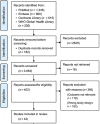Micronutrient and protein-energy supplementation enhance vaccine responses in undernourished children: Evidence from a systematic review
- PMID: 40787612
- PMCID: PMC12334918
- DOI: 10.12688/f1000research.164227.3
Micronutrient and protein-energy supplementation enhance vaccine responses in undernourished children: Evidence from a systematic review
Abstract
Background: Malnutrition impairs immune function and vaccine responses, particularly in low-income settings. This can lead to reduced seroconversion rates and compromised herd immunity in children. Nutritional interventions have been proposed to enhance vaccine immunogenicity, yet evidence remains scattered and context specific.
Objective: This systematic review assesses the impact of nutritional interventions-especially vitamin A, zinc supplementation, and protein-energy rehabilitation-on serological responses to routine childhood vaccines among malnourished children in low- and middle-income countries.
Methods: Following PRISMA guidelines, we searched PubMed, Embase, Cochrane Library, and WHO Global Health Library for studies published between 2000 and 2024. Eligible studies included randomized trials, cohort studies, and systematic reviews reporting on nutritional supplementation and vaccine seroconversion outcomes in malnourished children.
Results: From 3,245 records, 42 studies met the inclusion criteria. Vitamin A supplementation improved measles vaccine seroconversion by 35%, especially among deficient children. Zinc enhanced responses to oral vaccines by 20%. Protein-energy rehabilitation significantly increased seroconversion rates for BCG and measles vaccines, particularly in children recovering from severe acute malnutrition.
Conclusion: Nutritional interventions improve vaccine immunogenicity among malnourished children. Integrated strategies combining immunization and nutrition services should be prioritized to address immunity gaps in vulnerable populations.
Keywords: Low- and Middle-Income Countries; Malnutrition; Micronutrients; Protein-Energy Supplementation; Seroconversion; Vaccine Immunogenicity; Vitamin A; Zinc.
Copyright: © 2025 Ngoie Mwamba G et al.
Conflict of interest statement
No competing interests were disclosed.
Figures
Similar articles
-
Micronutrient supplementation in adults with HIV infection.Cochrane Database Syst Rev. 2017 May 18;5(5):CD003650. doi: 10.1002/14651858.CD003650.pub4. Cochrane Database Syst Rev. 2017. PMID: 28518221 Free PMC article.
-
Nutritional supplements for people being treated for active tuberculosis.Cochrane Database Syst Rev. 2011 Nov 9;(11):CD006086. doi: 10.1002/14651858.CD006086.pub3. Cochrane Database Syst Rev. 2011. Update in: Cochrane Database Syst Rev. 2016 Jun 29;(6):CD006086. doi: 10.1002/14651858.CD006086.pub4. PMID: 22071828 Updated.
-
The effectiveness of interventions to treat severe acute malnutrition in young children: a systematic review.Health Technol Assess. 2012;16(19):1-316. doi: 10.3310/hta16190. Health Technol Assess. 2012. PMID: 22480797 Free PMC article.
-
Nutritional supplements for people being treated for active tuberculosis.Cochrane Database Syst Rev. 2016 Jun 29;2016(6):CD006086. doi: 10.1002/14651858.CD006086.pub4. Cochrane Database Syst Rev. 2016. PMID: 27355911 Free PMC article.
-
Supplementation with multiple micronutrients for breastfeeding women for improving outcomes for the mother and baby.Cochrane Database Syst Rev. 2016 Feb 18;2(2):CD010647. doi: 10.1002/14651858.CD010647.pub2. Cochrane Database Syst Rev. 2016. PMID: 26887903 Free PMC article.
References
-
- Noya J, Kusumawati I, Lameky VY, et al. : Global trends in childhood immunization research: A bibliometric analysis of publications from 1974 to 2025. Trends Immunother. 2025;9(1):109–128. 10.54963/ti.v9i1.1010 - DOI
Publication types
MeSH terms
Substances
LinkOut - more resources
Full Text Sources
Medical
Miscellaneous



